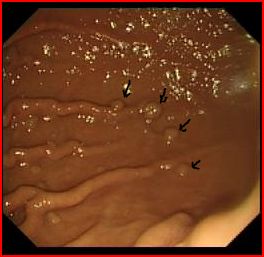Mr Roberts, a 55 year old gentleman had an OGD performed for iron deficiency anaemia. OGD was normal except showing:

What is the diagnosis?
Fundic gland polyps (FGP)
It is an incidental finding.

What are fundic gland polyps?
- FGP are believed to be hamartomatous polyps found in the fundus and upper body. However, FGPs are also associated with long term PPI use suggesting that other mechanisms related to the suppression of acid secretion may be involved in their pathogenesis. They are the most common type of polyps seen at endoscopy.
- They appear as smooth, glassy, sessile, circumscribed elevations (usually measuring <0.5 cm)
- Histologically, it shows one or more cystically dilated oxyntic glands with flattened lining cells.
Discuss the causes of FGP?
- Sporadic- these are few in number and found exclusively in patients without H. Pylori infection
- PPI use- large numbers of polyps may exist, but these regress on stopping PPI treatment
- Associated with FAP- when multiple FGPs are diagnosed in a young patient, FAP should be considered.
Discuss the management of FGP?
Sporadic and PPI associated FGPs have low malignant potential and no ominous associations. By contrast, a definite risk of dysplasia (between 30% and 50%) is present in FAP associated FGPs. Thus FGP should be carefully biopsied in FAP.
Dysplasia in FGPs was associated with large polyp size (>1 cm), increased severity of duodenal polyposis, and antral gastritis.
Discuss the management of FGP in patients on PPI?
- In patients on PPI therapy with typical, small (<0.5 cm) FGPs, diagnosis is confirmed by taking a biopsy specimen from one polyp.
- Biopsy specimens are taken from all polyps 0.5–1.0 cm in size.
- PPI therapy is not discontinued in patients with smaller polyps.
- Larger polyps (>1 cm) are removed and, if clinically appropriate, PPI therapy is discontinued in these patients.
Ref:






